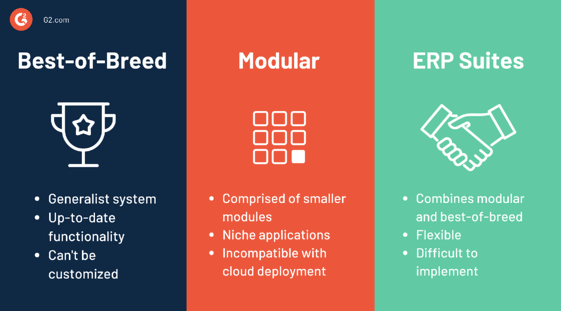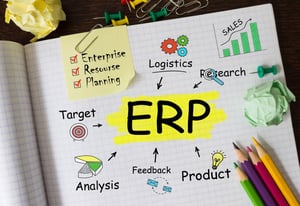Published: January 13, 2021
The definition and concept of the acronym "ERP" can be confusing. A lot of business professionals associate it entirely with software, while others understand it in a more holistic way, associating it with daily operations.
To put it in its simplest terms, ERP stands for "enterprise resource planning." However, for an outsider or someone unfamiliar with this concept, this can feel a little too abstract, making it hard to see how this concept applies to business. What exactly constitutes as enterprise resources? Does that strictly refer to financial resources? Is the acronym only referring to operating systems?
If you're trying to dissect this acronym and continue to find several different variations of this definition, you're not alone. You can get lost in a sea of meanings amid the 20 different explanations of the term. Instead of falling down that wormhole of semantics, let's look at ERP in the context of what an ERP system is and how you can use it to streamline your business, saving you money and time, thereby increasing your revenue.
Quick Links
- What Is an ERP System?
- The History of ERP Systems
- How ERP Systems Fit Your Unique Needs
- Types of ERP System Models
- What Are the Benefits of ERP Systems?
- How Can CAVU ERP Improve Your Profitability and Performance?
What Is an ERP System?
As noted above, ERP stands for enterprise resource planning. Typically, in business, any time the word "enterprise" is used, it’s a reference to the entirety of a business, every department and every team across the organization. Resources are the people, objects, and tools you need to run that enterprise. Planning is the integration or management of all of those components.
So, simply put, ERP systems allow businesses to compile all of their resources within one system (a software platform) to simplify planning and management. As a result, teams can more effectively communicate and share information so their workflows are smoother and more efficient. In fact, 95% of businesses report improvements to their workflow after adopting an ERP software.
As technology continues to improve at rapid rates, the future landscape of ERP software solutions looks to be expanding, offering plenty of options to businesses looking to streamline and grow. However, this concept is not new. In fact, it dates back nearly 100 years.
The History of ERP Systems
Briefly, in the boom that followed World War II, manufacturers and supply companies needed a method to manage resources, plan production lines, and guarantee that factories had the materials they needed to produce the products that were in demand. This was the genesis of the MRP, or material requirements planning, systems that ran on the kind of mainframes we see in historic film reels from the 1960s. They helped factories and businesses determine what they needed, when they needed it, and how much.
It should come as no surprise that this revolutionized a company’s ability to respond to the market and better prepare for demands as well as begin to track and analyze business forecasts. In turn, the companies harnessing those abilities saw growth and success. The ability to control stock and, in turn, costs enabled industries to invest wisely and utilize resources more efficiently.
All the way through the 1970s, MRP created a boon for businesses that figured out how to manage all their resources in one place, allowing them to reverse engineer their finished product and manage the production lines. With no lack of ingenuity in production and manufacturing businesses, it didn’t take long for someone to ask, “What if?” — as in, “What if we could use this same concept across the entire company?” This is the birth of ERP.
The ERP system takes that same concept, those same questions (“What?” “When?” “How much?”) and asks it of every department throughout an organization, enabling the sharing of that information so that all teams are in alignment. In the same way that MRP systems transformed production lines, ERP systems can transform the entirety of your business.
How ERP Systems Fit Your Unique Needs
This all sounds great, right? It gets better. Ford developed the assembly line in a way that innovated the car manufacturing industry. McDonald’s took that same concept and applied it to food. In business, one of the greatest skills someone can cultivate is an ability to adapt effective processes and utilize them in different industries, including ones they weren’t initially developed to include. While ERP systems have their roots in the manufacturing industry, they’ve grown well beyond that.
Depending on your industry, the size of your business, or your IT infrastructure needs and capabilities, ERP systems have evolved to meet the needs and challenges of each.
ERP Software Fits All Business Sizes
The word enterprise evokes images of large multinational companies, but ERP has been designed to help even small businesses manage and monitor their needs. Further, they also provide room for inevitable growth once the ERP software is leveraged to streamline a business.
A mid-sized business or even a large business might need a bit more. Fortunately, there are solutions available for all sized businesses depending on what their particular needs and goals are. Regardless of size, the end goal is seamless integration and alignment.
ERP Software Supports Many Industries
Again, while the origins of ERP and MRP were in the manufacturing sector, they transitioned smoothly to other sectors that rely on the same type of data sharing and resource/asset management that manufacturing requires. It’s not just the manufacturing industry that needs to monitor a supply chain, manage resources (both human and physical), communicate between facilities and locations, and oversee business critical finances, sales, and customer service.
ERP software allows your business to do all of that within one system, no matter your industry. Some of the industries where ERP systems are most commonly used include the following:
- Retail
- Wholesale distribution
- Pharmaceutical
- Hospitality
- Manufacturing
- Construction equipment rental
- Technology
ERP Software Is Adopted in Any IT Infrastructure
Cloud computing has the potential to change a lot of industries, particularly those who are reliant up on data, its storage and transmission, and who require the most up-to-date security and network reliability. ERP software that utilizes cloud computing offers companies the opportunity to be prepared for growth with greater flexibility and outsourced IT support, which enables them to focus on other business needs.
Options exist for on-premises deployment as well, enabling a business to have complete control of the system. However, this option can also require more IT professionals and the challenges that come along with data storage. Similarly, businesses that need a mix of the two can opt for a hybrid solution that leverages the capabilities of the cloud, but still affords control over business critical data.
But wait...there’s more. ERP systems can then further be broken down by system models.
Types of ERP System Models
There are three kinds of ERP system models for you to consider when you're looking for a good fit for your business: Best of Breed, Modular, and Suites. In short, these refer to the functionality your business needs.

Source: G2
Best of Breed ERP
As the name suggests, these ERP systems provide all the bells and whistles. They come as one unit, and, the downside, they operate as a one-size-fits-all option. Though they’ve been finely tuned to meet business needs, are highly reliable, and have a wide range of uses, they’re not customizable.
Modular ERP
Modular ERP systems allow you to pick and choose which elements you need for your business. In this way, they’re customizable, which is great for cost savings and functionality, but if growth is your game, they’re not quite cloud compatible, so that’s something to keep in mind.
ERP Suites
The suite offers a combination of the best of breed and modular options, so it is, inherently, a bit more flexible. However, it’s usually made up of multiple different vendors offering different software and as, as a result, can be difficult to implement.
As it’s probably clear now, there are a lot of options on the table in regard to ERP functionality, performance, and features. As you look at this solution for your business, the first step is, undoubtedly, determining what you need this ERP system to do for you.
 What Are the Benefits of ERP Systems?
What Are the Benefits of ERP Systems?
With a clearer understanding of exactly what an ERP system is, we can move into how this kind of software can benefit your business. If we revisit the Henry Ford example, the reason he has been so revered for his innovations is because he created production lines that resulted in greater productivity while resources were used more efficiently. ERP systems have that same potential, offering plenty of advantages for your business.
Improved Data Sharing
The foundation upon which all ERP benefits are built is the capacity you have to share data and vital information across your organization. It’s hard for two hands to complete one job, when one hand is doing its own thing. ERP software allows multiple departments to share and access the data they need.
More Robust Reporting
Access to company wide data enables you to build reports that are more inclusive, more up-to-date, and more robust. With a bird’s eye view rather than one from the ground, team leaders and decision makers have a stronger grasp on the interconnectedness of business functions and can reliably share that information with others.
Improved Inventory Management
Inventory issues are one of the biggest costs factors in any industry. If you're overstocked, you end up losing money. Understocked inventories can turn customers away and damage your reputation. Being able to find the balance and to forecast for future needs saves you money in the long run.
Better Supply Chain Management
Enable your teams to forecast what they’ll need and when, and predict future issues. If you can prevent supply chain problems before they happen, you’re better positioned to meet market demands.
Improved Cash Flow
Streamlining your invoices and managing your accounts receivable and payable all in one place allows you to see cash in and cash out in a simplified way. This helps you best determine where and when to make investments for growth.
Increased Savings
From inventory management and supply chain data to better customer service, nearly every other benefit of ERP systems leads to saving you money.
Higher Quality Customer Service
With improved internal communications as well as reliable supply chains and inventory control, the end result is that you’ve got customers who count on you. It builds reputation and enables your sales team and customer service representatives to deliver on promises made.
Simply put, using ERP software is a better method for managing your business. If you spend less time worrying about business systems and communications, and you can automate tasks to meet your needs, you can spend more time on building your business and satisfying your customers.
How Can CAVU ERP Improve Your Profitability and Performance?
If you’re looking for an ERP solution that includes both the software and the support you need, from implementation to ongoing client support, then CAVU ERP is right for you. With multiple options for implementation and deployment and with expertise in a variety of industries, from mason supply to wholesale distribution, our team will help find the right solution for your business.
Get in touch with our experts today to explore your options and let us help you turn your business into the well-oiled machine it could be.

